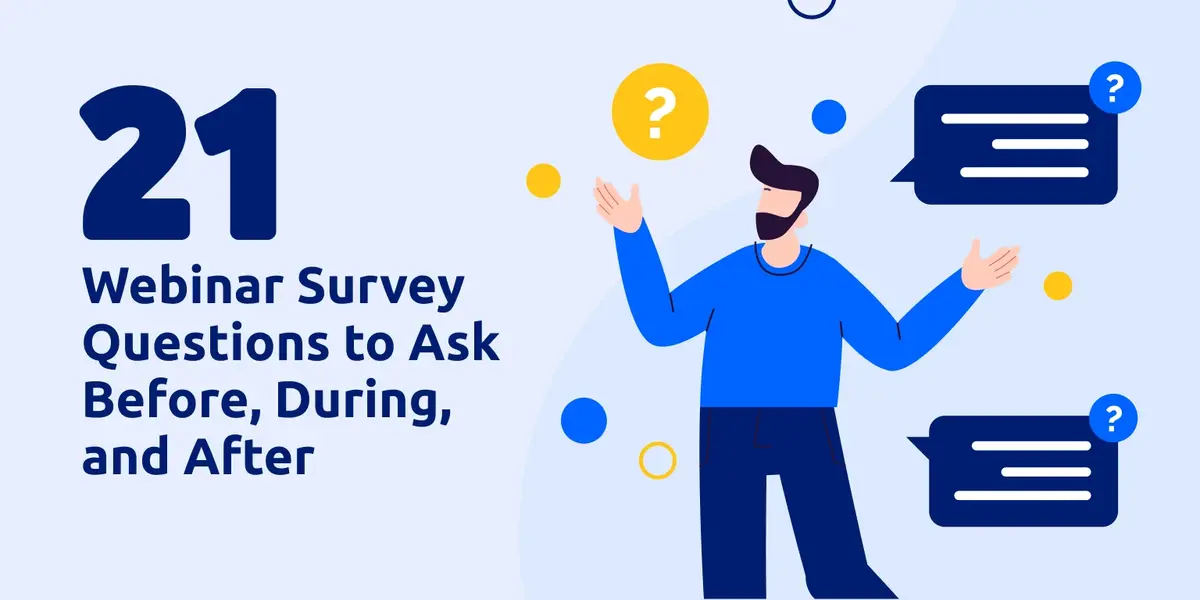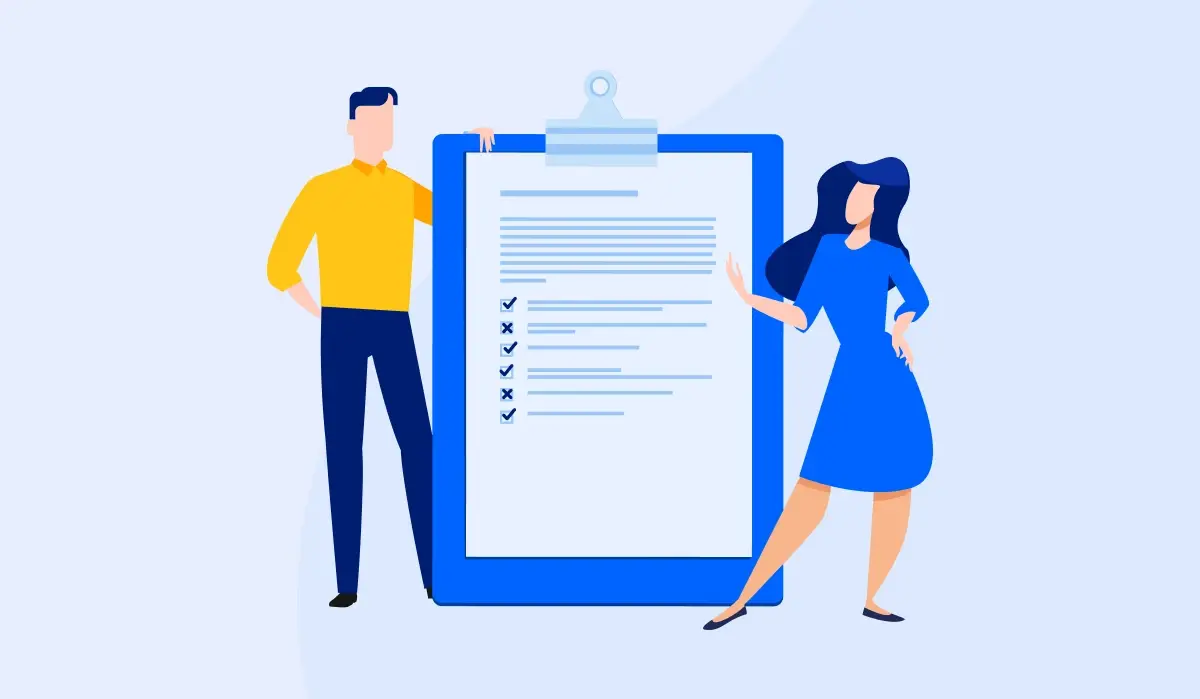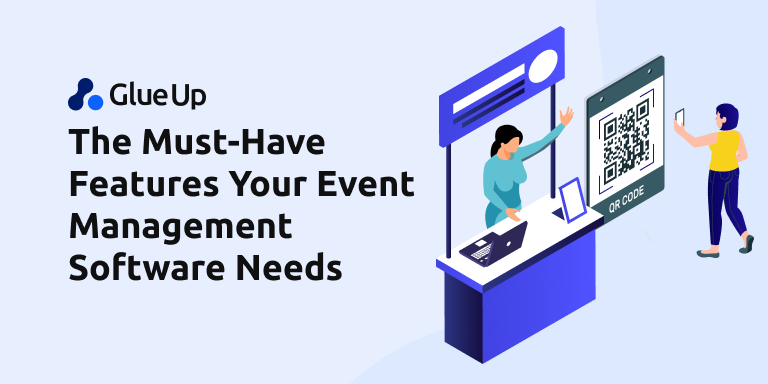
Key Takeaways
- Surveys are an important tool for improving webinars and events. They can provide feedback and information from audience members that you may not be able to receive any other way. This feedback can help you improve the quality of your webinars, target your audience more effectively, and create more valuable experiences for your attendees.
- When designing a webinar survey, it's important to keep it short and easy to complete. This will increase the likelihood that people will actually fill it out, and it will also ensure that you get high-quality feedback.
- It's also a good idea to include pre-webinar questions. This can help you gauge the interest of your audience and ensure that they're getting the value they expected from the webinar.
Surveys are an important aspect when it comes to webinars and events because it provides feedback and information from your audience members you may not be able to receive any other way. Surveys can assist in an objective view of your webinars and see the improvements you can make. This creates a higher accuracy than relying on gut feeling. It can also help you with the future targeting of audiences by looking at target populations and analyzing the data. In short, surveys can help you improve the quality and the customer perceived value of your webinars and events.
Skip To
Tips for Designing a Webinar Survey

When you send your survey out, you want to have as many participants respond to the survey as possible. This ensures that you get the most feedback from the participants which can be used to improve your webinar and also lowers the possibility of skewed results. These tips below can ensure that more people follow through with your survey and not immediately be deterred when they open the form.
Start with the Easy Questions
When designing your webinar survey, start with the easy questions first. The easy questions can consist of true/false, or multiple-choice questions. Starting with the easier questions allows the participant to be more willing to start filling out the survey because of the perceived belief that it would be a quick survey, and not take up a lot of their time. And as the survey goes on, you put your open-ended questions near the end. This ensures the participants will be more willing to complete your survey because they have already invested their time in it.
Not too Long
Your survey should never be too long because a long survey will deter your participants from filling out the survey and lower the quality of your survey answers. A survey that takes 20 mins or more to complete will start having less thoughtful and lower quality responses. In order to have your participants fill out a survey with good information, make sure that your survey takes less than 15-20 minutes to complete.
Limit the Choices
When writing a closed-ended question, ensure that you do not have too many decisions for your participants to choose from. More choices often lead to worse user experiences. In order to limit create a good user experience, limit the choices. But if there are many choices needed, you can always put an “other” option where your participant can fill out their choice.
Pre-Webinar Questions

Pre-Webinar questions are a good way to gauge the interest of the audience for your webinar and it can help with some aspects of the planning process. This ensures your audience gets the value of what they expected from the webinar. In addition, this early engagement with the audience members before your webinar will also encourage them to attend the webinar when the day comes.
1. Which speakers are you excited about?
This question can help you understand who the webinar audiences want to see. This can assist in your planning by allowing that speaker to have more time sharing their ideas and also have them speak at more of your webinars to increase the number of paying audience members.
2. Have you attended our events or webinars before?
This question illustrates the number of audience members that are returning customers. This shows your customer retention rate. Loyal audience members prove that you are hitting the right topics for your target audience.
3. How did you hear about this webinar?
Finding out where audience members heard about your events can help you decide on what platforms to market your webinars. Increased promotion on these platforms can help you with an uptick in sales for your webinar.
4. Why did you choose to attend this webinar?
This can help you figure out what aspects of the webinar are the most attractive to audience members. You could be picking all the right topics that audience members are currently interested in, or your audience members could be really pleased with your speakers. Figuring out what you are doing right can help you continue doing it right.
5. What device are you planning on using?
If different audience members are planning on using different devices, such as a mobile device, your webinar platform needs to be able to support that. A webinar platform that can support all the devices that your audience members are using will not deter any audience member from any future webinars.
6. Was there any information that was hard to find?
Some information that the audience member may want or need may not be readily available for them before the webinar. Asking this question can ensure all the necessary information was provided to the audience member ahead of time.
During Webinar Questions

7. Are there any tech issues you are experiencing?
Tech issues can occur during your webinars and they could ruin an audience member’s experience of your webinar. Asking this question allows some audience members to bring up an issue that the tech team can try to fix it for them. You could have a separate survey box that is consistently open so they can ask for help whenever needed.
8. Are there any things you would like the speakers to elaborate on?
This survey question can be sent out through the webinar platform near the end of the webinar. This ensures that the audience members do get the information they joined the webinar for. This creates value for your audience members and incentivizes them to become repeat customers
9. Are there any questions?
This is always an important question to ask that can be on a survey on your platform. Being an open-ended question the audience members can ask any question to the topics they are confused about. Audience members who have their questions cleared up leave with higher satisfaction.
Post-Webinar Questions

Post webinar questions can arguably be the most important questions you ask. When you send out your post-webinar survey, you get feedback on the delivery of your webinar, which is the product/service that your audience members paid for. All feedback negative or positive can help improve your webinars to keep the most amount of recurring customers.
10. How would you rate the webinar?
This is a simple question that gets straight to the point with your audience members. This question should be asked in a scaled format and allows you to gather how much your audience enjoyed your webinar. If they enjoyed it, you are doing something right. If they did not enjoy it, you need to figure out what's wrong and change it before you lose all your audience members.
11. How would you rate the speakers?
The speakers are an integral part of your webinars. Amazing speakers can be a great benefit to your webinars. When your recurring audience members enjoy the speakers that are a part of your webinars, it keeps them as recurring customers and improves the overall value of your webinar.
12. How would you rate the technology?
The technological aspect of webinars is one of the most important things to consider. Since everything needs to be done online on computers, the technology has to work for all your audience members. If you could get feedback on how to improve aspects of your tech, it would improve your audience member’s experiences.
13. Were your expectations met?
Going into a webinar, your audience members will have an internal expectation of the quality and the value that they are predicting they would get out of the webinar. Of course, you would want to meet the expectation at the least. But knowing whether or not audience members were impressed by the webinar or were disappointed can prove invaluable data for you and the future of your webinars.
14. How satisfied are you with the networking tools?
Networking is important for may of your audience members who join your webinars. You must provide good networking tools to create value for your audience members. If the tools are up-to-par, you would be creating value not only on the information shared on your webinar but also the connections they make attending it.
15. Would you contact someone you networked within the webinar?
The next step of good networking tools is that the audience members contact the people they networked with during the webinar. If they are planning on contacting the people they networked with, they are getting an additional value, which is good for the perception of your webinar
16. Has your perception of the company improved through the webinar?
Having your audience members have a more positive perception of your company can increase sales. And if your webinar helps drive revenue from ticket sales as well as increases the perception of your company, you are killing two birds with one stone!
17. What were your favorite/least favorite moments in the webinar?
This helps you identify the driving factors on why an audience member may become a recurring audience member or not. Focusing on the positive aspects and ensuring that they do not falter while improving the negative aspects will improve your webinar overall.
18. Did you find the platform easy to use?
An easy to use platform for a webinar is crucial for repeat audience members. Because of a gentle learning curve, more people will be able to join the webinar and be more willing to come back because it does not require difficult planning on their end.
19. How likely would you recommend this webinar to a friend?
If your audience members enjoy your webinars and recommend your webinar to a friend, it can drive ticket sales. This can also increase the number of recurring audience members you have.
20. Will you join our next event?
This is a straightforward question that can help you figure out who would become a recurring customer or not. High numbers mean that you have hosted a successful webinar, low numbers mean that there are improvements to be made.
21. Any improvements that can be made to the webinar?
There are always improvements to be made to your webinar to create more customer value. Some of these improvements may not be highlighted by your other survey questions, so make sure this is an open-ended question, and that your audience members can explain and give their feedback.
Download Whitepaper: How Digital Transformation Enables Professional Communities to Thrive
Value of Information
Information about your webinar from your audience is of immense value. Always remember that you are trying to create value for them so they will keep attending your webinars. Take their feedback and use it to build even better webinars in the future, and you're sure to see your online events skyrocket in popularity and value.
Are you looking to find ways to not only provide value through surveys, but smarter ways to deploy surveys to your webinar or in-person event audiences? Book a demo with Glue Up today, and we'll show you how our platform has been helping thousands of customers with their digital engagement.

"We are very happy with the implementation of the software. In a very fast and simple way, we are able to coordinate an event, from sending mass invitations to the access of subscription of every single one of the invitees, we can monitor who received an invitation and who has opened it."
Carlos Castro Sánchez
Presidente, Asociacion ALE IAP
Read the full case study here >Frequently Asked Questions (FAQs)
What is the purpose of a webinar survey?
A webinar survey is a way to gather feedback from attendees about the webinar. This feedback can be used to improve future webinars.
How do I design a successful webinar survey?
Keep your survey short and to the point, use close-ended questions, and include a thank you page.
What are some good questions to ask in a webinar survey?
Some good questions to ask in a webinar survey include:
how would you rate the webinar?
how much of the content was new to you?
how would you rate the presenter's knowledge and presentation skills?
When should I send a webinar survey?
You should send a webinar survey within 2 hours of the webinar ending. This is when the feedback is still fresh in the attendees' minds.
What are some of the benefits of sending a webinar survey?
There are many benefits to sending a webinar survey, including: improving future webinars, getting feedback from attendees, and building relationships with attendees.
What are some of the challenges of sending a webinar survey?
Some of the challenges of sending a webinar survey include: getting a high response rate, writing good questions, and analyzing the results.
How do I get a high response rate for my webinar survey?
There are a few things you can do to get a high response rate for your webinar survey, including: sending the survey out immediately after the webinar, making the survey short and easy to complete, and offering an incentive for completing the survey.
What are some common mistakes people make when sending a webinar survey?
Some common mistakes people make when sending a webinar survey include: sending the survey too late, making the survey too long, and not offering an incentive for completing the survey.
How do I analyze the results of my webinar survey?
There are a few different ways to analyze the results of your webinar survey, including: looking at the average rating, looking at the distribution of ratings, and looking at the open-ended comments.
What are some tips for writing good webinar survey questions?
Some tips for writing good webinar survey questions include: keeping the questions short and to the point, using clear and concise language, and avoiding bias.
What are some common types of webinar survey questions?
Some common types of webinar survey questions include: rating questions, yes/no questions, and open-ended questions.
What are some other resources that can help me with my webinar survey?
There are a number of resources that can help you with your webinar survey, including: online templates, webinar survey software, and webinar survey consultants.



